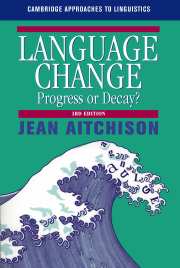1 - The ever-whirling wheel
The inevitability of change
from Part 1 - Preliminaries
Summary
Since 'tis Nature's Law to change.
Constancy alone is strange.
John Wilmot, Earl of Rochester, A dialogue between Strephon and DaphneEverything in this universe is perpetually in a state of change, a fact commented on by philosophers and poets through the ages. A flick through any book of quotations reveals numerous statements about the fluctuating world we live in: ‘Everything rolls on, nothing stays still’, claimed the ancient Greek philosopher Heraclitus in the sixth century bc. In the sixteenth century, Edmund Spenser speaks of ‘the ever-whirling wheel of change, the which all mortal things doth sway’, while ‘time and the world are ever in flight’ is a statement by the twentieth-century Irish poet William Butler Yeats – to take just a few random examples.
Language, like everything else, joins in this general flux. As the German philosopher–linguist Wilhelm von Humboldt noted in 1836: ‘There can never be a moment of true standstill in language, just as little as in the ceaseless flaming thought of men. By nature it is a continuous process of development.’
Even the simplest and most colloquial English of several hundred years ago sounds remarkably strange to us. Take the work of Robert Mannyng, who wrote a history of England in the mid fourteenth century. He claimed that he made his language as simple as he could so that ordinary people could understand it, yet it is barely comprehensible to the average person today:
In symple speche as I couthe,
That is lightest in mannes mouthe. […]
- Type
- Chapter
- Information
- Language ChangeProgress or Decay?, pp. 3 - 18Publisher: Cambridge University PressPrint publication year: 2000

